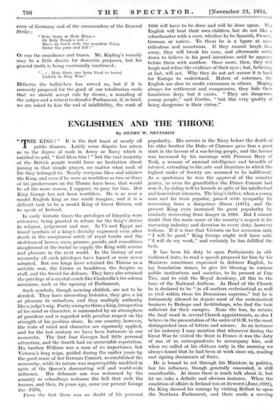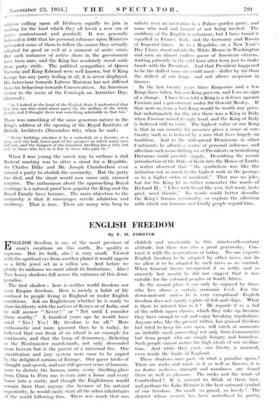ENGLISHMEN AND THE THRONE
By HENRY W. NEVINSON
" THE KING ! " It is the first toast at nearly all public dinners. Lately some dispute has arisen as to the degree of rank in Army. or Navy which is entitled to add, " God bless him I " but the vast majority of the British people would have no hesitation about joining in that simple prayer, no matter what rank of life they belonged to. Nearly everyone likes and admires the King, and even if he were as worthless as two or three of his predecessors on the Throne have been, that would be all the more reason, I suppose, to pray for him. But King George has not been worthless. He is as near a model English king as one could imagine, and it is a difficult task to be a model King of Great Britain, not to speak of Ireland.
In early historic times the privileges of kingship were extensive, being granted in return for the king's duties in religion, judgement and war. In Ur and. Egypt are found symbols of a king's divinity expressed even after death in the sumptuous outfit of royal tombs and the skeletons of horses, oxen, grooms, guards, and concubines slaughtered at the burial to supply the King with service and pleasure in the next world. In the history of our monarchy all such privileges have lapsed or were never adopted. But our kings have retained the Throne as a suitable seat, the Crown as headdress, the Sceptre as staff, and the Sword for defence. They have also retained the privilege of a crystal coach like Cinderella's for solemn occasions, such as the opening of Parliament.
Such symbols, though seeming childish, are not to be derided. They have interesting histories, they give a lot of pleasure to onlookers, and they multiply authority like a judge's wig. Partly owing to them a king, irrespective of his mind or character, is surrounded by an atmosphere of grandeur and is regarded with peculiar respect on the strength of his position alone. In our country, however, the tests of mind and character are rigorously applied, and for the last century we have been fortunate in our monarchs. The first four Georges had little personal attraction, and the fourth had an unenviable reputation. His brother William was a man of no importance, but Victoria's long reign, guided during the earlier years by the good sense of her German Consort, re-established the monarchy, while its nature was imperceptibly modified in spite of the Queen's dominating will and world-wide influence. Her debonair son was welcomed by the country as schoolboys welcome the bell that ends the lessons, and then, 24 years ago, came our present George the 'Fifth.
From the first there was no doubt of his personal popularity. His service in the Navy before the death of his elder brother the Duke of Clarence gave him a good start in the favour of a sea-loving people, and the favour was increased by his marriage with Princess Mary of Teck, a woman of unusual intelligence and breadth of interest, extending to the arts and litecature to which the highest ranks of Society are assumed to be indifferent. As a sportsman he won the approval of the country gentry, as even his grandfather the Prince Consort had won it, by riding well to hounds in spite of his intellectual and benevolent interests. The king's father, when a young man and far from popular, gained wide sympathy by recovering from a dangerous illness (1871), and the present King even increased his great popularity by similarly recovering from danger in 1929. But I cannot doubt that the main cause of the country's respect is his unceasing industry and devotion to every duty, however tedious. If it is true that Victoria on her accession said, " I will be good," King George might well have said, " I will do my work," and certainly he has fulfilled the task.
It has been his duty to open Parliaments in old- fashioned state, to read a speech prepared for him by his Ministers sometimes expressed in dubious English, to lay foundation stones, to give his blessing to various public institutions and societies, to be present at Cup Ties, and to visit the Royal Academy, all this to the tune of the National Anthem. As Head of the Church he is declared to be " in all matters ecclesiastical as well as civil within these his Dominions supreme," but he is fortunately allowed to depute most of the ecclesiastical business to Bishops and Archbishops, who find the task sufficient for their energies. None the less, he retains the final word in several Church appointments, as also I believe in the presentation of the order of O.M. to the most distinguished men of letters and science. As an instance of his industry I may mention that whenever during the Great War he visited the front in France it was the duty of one of us correspondents to accompany him, and when we called at his château early in the morning we always found that he had been at work since six, reading and signing documents of State.
He is bound to act through his Ministers in politics, but his influence, though generally concealed, is still considerable. At times there is much talk about it, but let me take a definite and obvious instance. When the' condition of affairs in Ireland was at its worst (June,1921), the King showed his courage by visiting Belfast to open the Northern Parliament, and there made Et moving. address calling upon all Irishmen equally to join in making for the land which they all loved a new era of peace, contentment and goodwill. It was generally believed in 1981 that his personal influence upon Ministers persuaded some of them to follow the course they actually adopted for good or evil at a moment of acute crisis. But such instances of active share in the government have been rare, and the King has resolutely stood aside from party strife. The political sympathies of Queen Victoria and King Edward were well known, but if King George has any party feeling at all, it is never displayed. His behaviour towards Labour Ministers has not differed from his behaviour towards Conservatives. An American visitor to the scene at the Cenotaph on Armistice Day, observed " As I looked at the head of the English State I understood that here was one who stood above party for the welfare of the whole people, and I thought there was something admirable in that too."
There was something of the same generous nature in the King's address at the opening of the Royal Institute of British Architects (November 8th), when he said :
" Every building, whether it be a cathedral, or a factory, or a shop, or a city hall, forms part. of the prospect on which many eyes will rest., and the designer of the humblest dwelling has a duty not only to those who live in it but to those who pass by."
When I was young the surest way to enthuse a dull Radical meeting was to utter a shout for a Republic. Sir Charles Dilke and Mr. Joseph Chamberlain even formed a party to abolish the monarchy. But the party has died, and the shout would now cause only amused surprise. The enthusiasm about the approaching Royal marriage is a natural proof how popular the King and the Royal Family have become. The main objection to the monarchy is that it encourages servile adulation and snobbery. That is true. There are many who brag to satiety over an invitation to a Palace garden party, and sonic who wail and lament at not being invited. The snobbery of the English is notorious, but I have found it equalled in France, Italy. and the Germany and Russia of Imperial times. As to a Republic. on a New Year's Day I have stood outside t In' White House in Washington and seen an almost endluss queue of American citizens, waiting patiently in the cold hour after hour just. to shake hands with the President. And that President happened to be the dullest man one could meet—duller by far than the dullest of our kings---and not above suspicion in finance.
In the last twenty years three Emperors and a few Kings have fallen, but our King goes on, and I see no sign of a change. I have been told a King is a defence against Fascism and a government under Sir Oswald Mosley. If that were so, even a bad King would be worth any price, but unfortunately for this idea there was a King in Italy when Fascism raised its ugly head, and the King of Italy is believed still to exist. The highest value of our King is that in our country his presence gives a sense of con- tinuity such as is beloved by a race that lives largely on tradition. And to the widespread Dominions in other Continents he affords a centre of personal influence and affection such as no shifting set of Presidents or brutalizing Dictators could possibly supply. Describing the recent introduction of the Duke of Kent into the House of Lords, a writer observed that: " the symbolism was like the initiation not so much to the highest rank in the peerage as to a higher order of mankind." That was no joke, but for the King let us rather remember the words of Richard II : " I live with bread like you, feel want, taste grief, need friends." No words could better describe the King's human personality, or explain the affection with which our humane and kindly people regard him.

























































































 Previous page
Previous page